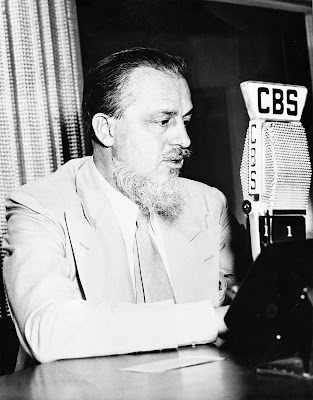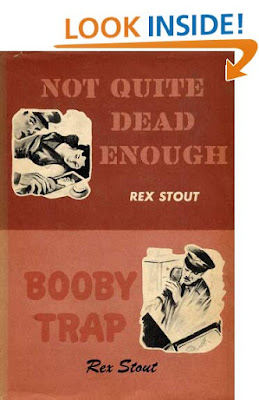But wait.
It's 1944, and WWII is raging. Rex Stout
himself is fighting for his country, exposing enemy propaganda in
regular broadcasts via CBS as "Our Secret Weapon." How
could he not allow his two favorite detectives to join up? Wouldn't
be patriotic. Hence Not
Quite Dead Enough, which
consists of two novellas:
Archie Goodwin, a major in Army Intelligence, deliberately
incriminates himself in a murder, to persuade his bull-headed former
boss to give up notions of soldiering and come to work with him doing
detective work instead of carrying a rifle. It's the old
fall-backwards faith test with the point of a sword the bad-faith
consequence. That's the first novella, which gives its name to the
book. We may assume Wolfe relents, saves Archie's skin, and agrees to
lend his brilliant mind to the Army, because if he doesn't we won't
have Stout's two favorite detectives back in harness in the second
novella, The Booby Trap. And
we
do.
In
Not Quite Dead Enough Archie's
mission is to win Wolfe away from his determination to give up his
reclusive habits, sumptuous food, and tending his rooftop orchids.
Since beginning this Spartan
regimen with Fritz, his live-in chef, Wolfe has refused to meet or
speak on the phone with
anyone from the Army. He's
even dismissive of Archie when he shows up unannounced in uniform,
giving the impression he's on leave. Archie
tries his signature sarcasm: "You
are wrong," he tells
Wolfe, "if you think
your sudden appearance in the front lines will make the Germans laugh
themselves to death. They have no sense of humor.”
It doesn't work.
Restrained
for time, and seeing he's unlikely to persuade Wolfe without resorting
to drastic measures, he resorts to a
drastic measure:
implicating himself in
the strangulation of a young woman with a personal problem who'd been
trying unsuccessfully to meet with Wolfe. Archie deliberately leaves
his fingerprints in the woman's apartment, yanks fifteen hairs out of
his head and inserts them under the scarf that's wrapped around the
corpse's neck.
It doesn't take Wolfe's and
Archie's police nemesis,
Inspector Cramer, long to identify the fingerprints and the head that
had produced the hairs.
In
jail already next
morning as a material witness
when the local paper hits the
street, Archie reads on the
Courier's front page:
ARMY MAJOR HELD IN MURDER
CASE/NERO WOLFE’S FORMER ASSISTANT LOCKED UP. Well,
guess who skips his morning jog with Fritz and shows up at the jail,
outraged?
Archie persuades Wolfe
he'd done what he did to get
Wolfe's attention, and Wolfe
agrees to help Archie prove who really strangled the woman, and the
two persuade Cramer to release Archie so
they
can solve the murder. This
they promptly do. Did we have any doubts?
Comes
now The Booby Trap.
Wolfe has for some time since the murder case given up "training"
for the Army, and has been
working with Army Intelligence in apparently various classified
matters. Their current case involves a letter a local congressman's
received warning that the purported suicide of an intelligence
captain was in fact a murder, and that it involved the massive theft
of war materials, including a newly developed grenade. Archie and
Wolfe meet with a general, a couple of colonels, and the congressman
to discuss the letter. Afterward, when everyone's at lunch, one of
the grenades explodes, killing Archie's commanding officer, Col.
Ryder. Ryder had told everyone at the meeting he planned to leave for
Washington right afterward to speak with Army Intelligence's
commanding general.
Archie
determines that one of the special grenades had been rigged to
detonate when Col. Ryder opened his suitcase. Archie and Wolfe set up
their own psychological trap, and inviting everyone who had been in
the meeting to Wolfe's brownstone home/office. It's a standard setup
Wolfe has used in other cases with multiple suspects. It always
works, and, of course, it works now. I found the ending a tad
unexpected, but upon reflection I could see at work a nod to the
tradition of honor in military situations dating back to the
conception of honor in military situations. As a modern metaphor it
is called falling on one’s sword.
Inspector
Cramer makes an appearance in this case, as well, despite the fact
it’s an Army matter,
because the Army’s offices
are in Cramer’s borough.
The “top mackaroo,” as Archie calls the New York unit’s
commanding general, is arguing with Cramer and
Wolfe over the efficacy
Cramer’s
interest in the investigation. Cramer notes
that he always works closely with Wolfe.
"Show
me a corpse, any corpse,” he
says, “under the most ideal
and innocent circumstances, with a certificate signed by every doctor
in New York, including the Medical Examiner. Then
show me Nero Wolfe anywhere within reach, exhibiting the faintest
sign of interest, and
I order the squad to go to work immediately.”
“‘Bosh.’ Wolfe nearly
opened his eyes. ‘Have I ever imposed on you, Mr. Cramer?’
“‘What!’ Cramer goggled
at him. ‘You’ve never done anything else!’
“‘Nonsense. At any rate,
I’m not imposing on you now. All this is a waste of time. You know
very well you can’t bulldoze the Army, especially not this branch
of it.’ Wolfe sighed. ‘I’ll do you a favor. I believe the mess
down there hasn’t been disturbed. I’ll go down and take a look at
it. I’ll consider the situation, what I know of it, which is more
than you’re likely ever to find out. Tomorrow I’ll phone you and
give you my opinion. How will that do?’
“‘And meanwhile?’ Cramer
demanded.
“‘Meanwhile you take your
men out of here and stay out.’”
And he did.
 |
Author
Rex
Stout and CBS News director Paul White review
propaganda that will be exposed on Our Secret Weapon (October
1942)
|



I like these two novellas also, Mathew. Stout did not write much else during the war, or at least not fiction.
ReplyDeleteEvidently, Tracy. Those were the only two listed between '42 and '46.
Delete